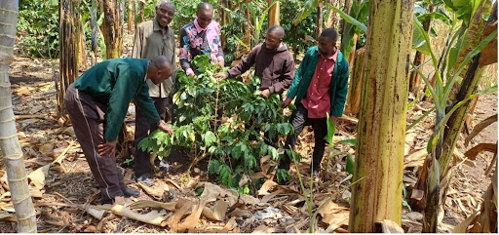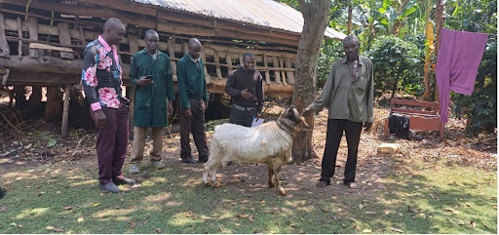01/11/24
Bigambwensi Deogratius: A Coffee Farmer's Growth in Rubirizi
Bigambwensi Deogratius is a coffee farmer from Omukabare B Village, in Rubirizi District, South-Western Uganda. He has been cultivating coffee since 2004, but like many smallholder farmers, he faced challenges such as pests, diseases, and low prices from middlemen, which limited his productivity and income.
In 2023, Kawacom Uganda Limited, as part of the Ugandan Smallholder Livelihoods Initiative, began working with farmers in Omukabare with support from the USAID Africa Trade & Investment (ATI) Program. The project, in partnership with organizations like ECOM Agroindustrial Corporation, aims to sustainably boost Ugandan exports of coffee and sesame by improving farming practices, expanding market access, and facilitating certifications like Organic and Rainforest Alliance (RA).

In Omukabare, Kawacom provided training to 101 farmers, including 43 women, on Good Agronomic Practices (GAP), certification standards, and post-harvest handling techniques. Mr. Bigambwensi found the training particularly valuable. This practice has helped him achieve better prices for his produce.
"I have learned proper harvest and post-harvest handling, including bulking my coffee to sell at once... With my continued participation in this project, I will plant more coffee on the new land I purchased and focus on the practices that have improved my yields," said Mr. Bigambwensi.
The training and support from Kawacom have had a positive impact on the community. The percentage of farmers in Omukabare selling their coffee directly to Kawacom increased from 18% in 2021 to 61% during the 2023-24 main season, allowing more farmers to benefit from Kawacom's competitive prices. These efforts align with the project's success in reaching over 9,996 MT of coffee and sesame purchases from smallholder farmers in a recent quarter, valued at $23 million.

For Mr. Bigambwensi, the benefits of these improvements are clear. With 47% of his household income now coming from coffee sales, he uses his earnings for home improvements, school fees for his children, and reinvestment in his farm.
Certification has been a key focus of the project, helping farmers like Mr. Bigambwensi meet international standards and secure premium payments. With the Organic and Rainforest Alliance certifications, Mr. Bigambwensi’s coffee meets the quality requirements for export to markets like the United States and Europe. Certification efforts are a significant part of Kawacom's strategy, contributing to over 38,000 farmers certified as of late 2024.
Kawacom’s support is part of a broader effort to strengthen Uganda’s coffee supply chain and improve livelihoods through targeted interventions. By focusing on quality practices, certifications, and market linkages, the Ugandan Smallholder Livelihoods Initiative has enabled farmers like Mr. Bigambwensi to overcome challenges, access new markets, and secure a more stable income.
More news
Research
Click to read this articleCMPs significantly decreased deforestation in the most at-risk protected areas in Africa since 2000
This article explores collaborative management partnerships (CMPs) between state wildlife authorities and nonprofit conservation organizations to manage protected areas (PAs) have been used increasingly across Sub-Saharan Africa since the 2000s.
Insights
Click to read this articleThe Cocoa Price - A Key Factor for a Living Income for Farmers
SWISSCO has published a brief regarding perspectives and solutions regarding the price of cocoa and how it is relevant for a living income for farmers.
Insights
Click to read this articleECOM's Green Meter
We are pleased to announce the official rollout of our internal carbon calculator, Green Meter, which has been third-party reviewed by SustainCERT.
Research
Click to read this articleClimate-Smart Agriculture and Agroforestry in Cocoa
This guidance document was published by SWISSCO and focuses on approaches, financing needs and opportunities as well as providing high level guidance for stakeholders in the cocoa sector seeking to establish a broad range of actions that take the complexity of crop- and site-specific impacts of climate change and the realities of smallholder cocoa farmers into account.
Insights
Click to read this articleBeginners guide to Carbon Credits
This report provides an overview of the Voluntary Carbon Market (VCM), from what it is to the roles of carbon standards, governments, and Indigenous Peoples in the VCM.
Research
Click to read this articleGoogle Earth Engine, an innovative technology for forest conservation
This report explores how Google Earth Engine (GEE) can and has been used as a land monitoring tool to help enforce forest protection laws, co-authored by ECOM's SMS Manager Coffee, Thuan Sarzynski.
Research
Click to read this articleIncome study of cocoa producing households in Ghana
The Swiss Platform for Sustainable Cocoa (SWISSCO), in collaboration with the Ghana Cocoa Board (COCOBOD) and other partner institutions such as FiBL and HAFL, conducted a joint study to assess the current income situation of cocoa farming households in Ghana.
Stories
Click to read this articleLiving Income in Latin America: Towards a Prosperous Future
The Living Income Community of Practice hosted the annual in-person workshop and learning journeys in Colombia during the week of the 4th of November.
Research
Click to read this articlePrinciples for Regenerative Landscapes — Circular Bioeconomy Alliance
This report advocates for a transition to a circular bioeconomy supporting biodiversity and human well-being through 10 key principles.